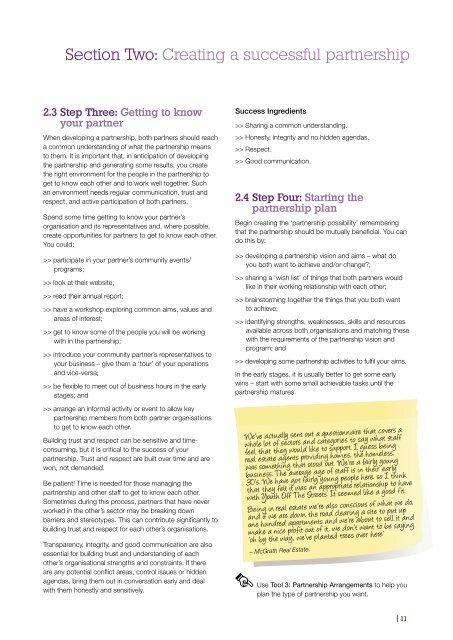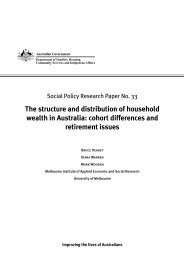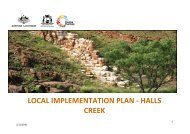partnering with community organisations - Department of Families ...
partnering with community organisations - Department of Families ...
partnering with community organisations - Department of Families ...
You also want an ePaper? Increase the reach of your titles
YUMPU automatically turns print PDFs into web optimized ePapers that Google loves.
Section Two: Creating a successful partnership<br />
2.3 Step Three: Getting to know<br />
your partner<br />
When developing a partnership, both partners should reach<br />
a common understanding <strong>of</strong> what the partnership means<br />
to them. It is important that, in anticipation <strong>of</strong> developing<br />
the partnership and generating some results, you create<br />
the right environment for the people in the partnership to<br />
get to know each other and to work well together. Such<br />
an environment needs regular communication, trust and<br />
respect, and active participation <strong>of</strong> both partners.<br />
Spend some time getting to know your partner’s<br />
organisation and its representatives and, where possible,<br />
create opportunities for partners to get to know each other.<br />
You could:<br />
>> participate in your partner’s <strong>community</strong> events/<br />
programs;<br />
>> look at their website;<br />
>> read their annual report;<br />
>> have a workshop exploring common aims, values and<br />
areas <strong>of</strong> interest;<br />
>> get to know some <strong>of</strong> the people you will be working<br />
<strong>with</strong> in the partnership;<br />
>> introduce your <strong>community</strong> partner’s representatives to<br />
your business – give them a ‘tour’ <strong>of</strong> your operations<br />
and vice-versa;<br />
>> be flexible to meet out <strong>of</strong> business hours in the early<br />
stages; and<br />
>> arrange an informal activity or event to allow key<br />
partnership members from both partner <strong>organisations</strong><br />
to get to know each other.<br />
Building trust and respect can be sensitive and timeconsuming,<br />
but it is critical to the success <strong>of</strong> your<br />
partnership. Trust and respect are built over time and are<br />
won, not demanded.<br />
Be patient! Time is needed for those managing the<br />
partnership and other staff to get to know each other.<br />
Sometimes during this process, partners that have never<br />
worked in the other’s sector may be breaking down<br />
barriers and stereotypes. This can contribute significantly to<br />
building trust and respect for each other’s <strong>organisations</strong>.<br />
Transparency, integrity, and good communication are also<br />
essential for building trust and understanding <strong>of</strong> each<br />
other’s organisational strengths and constraints. If there<br />
are any potential conflict areas, control issues or hidden<br />
agendas, bring them out in conversation early and deal<br />
<strong>with</strong> them honestly and sensitively.<br />
Success Ingredients<br />
>> Sharing a common understanding.<br />
>> Honesty, integrity and no hidden agendas.<br />
>> Respect.<br />
>> Good communication.<br />
2.4 Step Four: Starting the<br />
partnership plan<br />
Begin creating the ‘partnership possibility’ remembering<br />
that the partnership should be mutually beneficial. You can<br />
do this by:<br />
>> developing a partnership vision and aims – what do<br />
you both want to achieve and/or change?;<br />
>> sharing a ‘wish list’ <strong>of</strong> things that both partners would<br />
like in their working relationship <strong>with</strong> each other;<br />
>> brainstorming together the things that you both want<br />
to achieve;<br />
>> identifying strengths, weaknesses, skills and resources<br />
available across both <strong>organisations</strong> and matching these<br />
<strong>with</strong> the requirements <strong>of</strong> the partnership vision and<br />
program; and<br />
>> developing some partnership activities to fulfil your aims.<br />
In the early stages, it is usually better to get some early<br />
wins – start <strong>with</strong> some small achievable tasks until the<br />
partnership matures.<br />
We’ve actually sent out a questionnaire that covers a<br />
whole lot <strong>of</strong> sectors and categories to say what staff<br />
feel that they would like to support. I guess being<br />
real estate agents providing homes, the homeless,<br />
was something that stood out. We’re a fairly young<br />
business. The average age <strong>of</strong> staff is in their early<br />
30’s. We have got fairly young people here, so I think<br />
that they felt it was an appropriate relationship to have<br />
<strong>with</strong> Youth Off The Streets. It seemed like a good fit.<br />
Being in real estate we’re also conscious <strong>of</strong> what we do,<br />
and if we are down the road clearing a site to put up<br />
one hundred apartments and we’re about to sell it and<br />
make a nice pr<strong>of</strong>it out <strong>of</strong> it, we don’t want to be saying<br />
‘oh by the way, we’ve planted trees over here’<br />
– McGrath Real Estate.<br />
Use Tool 3: Partnership Arrangements to help you<br />
plan the type <strong>of</strong> partnership you want.<br />
[ 11




![pdf [107kB] - Department of Families, Housing, Community Services](https://img.yumpu.com/51272499/1/190x245/pdf-107kb-department-of-families-housing-community-services.jpg?quality=85)










![Land Claim - pdf [278kB] - Department of Families, Housing ...](https://img.yumpu.com/47002639/1/184x260/land-claim-pdf-278kb-department-of-families-housing-.jpg?quality=85)

![Borroloola Land Claim - pdf [299kB] - Department of Families ...](https://img.yumpu.com/46103973/1/184x260/borroloola-land-claim-pdf-299kb-department-of-families-.jpg?quality=85)